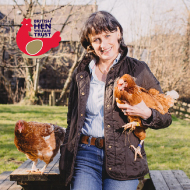
Research to be shared among veterinary professionals
The British Hen Welfare Trust (BHWT) has announced that it will be offering research grants of between £1,000 and £3,000 to veterinary surgeons and students working globally to improve pet hen health and welfare.
The charity, founded in 2005, has rehomed more than 750,000 commercial hens intended for slaughter. It works to improve hen welfare standards and educate the public on caring for pet hens, which have recently become the sixth most popular pet in the UK. Because of this, there has been an increase in the number of hens being brought into practice for treatment.
Grant applications will be open from 1 February 2020 and will be assessed for feasibility and suitability by a panel of veterinary professionals, as well as the Royal Veterinary College ethical review board.
The panel are searching for projects that have a fast, practical impact on diagnosing, managing and treating diseases in hens at a specialist level and in general practice. As well as those that will improve knowledge of hen welfare amongst general veterinary surgeons, allowing for wider access to treatment for chickens.
Jane Howorth MBE, founder and CEO of the BHWT said: “The scientific evidence and knowledge around pet hen health is currently very limited, which means that thousands of hens each year are either being unnecessarily euthanised or misdiagnosed.
“These new research grants will take hen health to the next level across the UK, providing practitioners with a wealth of material and guidance that has never been available before.
“Our hope is that these projects will increase knowledge about both common and rare disorders, resulting in better care and diagnosis and ultimately providing hens with a longer life expectancy.”
The results from the research will be published in peer-reviewed scientific or veterinary journals, in order to share knowledge to the wider veterinary profession.
Image (c) BHWT



 The RCVS has announced a new version of its 1CPD mobile app, with enhanced features for veterinary surgeons and veterinary nurses to record their continuing professional development.
The RCVS has announced a new version of its 1CPD mobile app, with enhanced features for veterinary surgeons and veterinary nurses to record their continuing professional development.